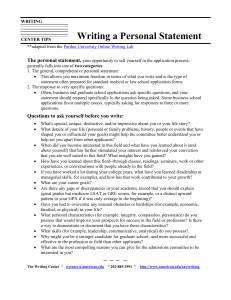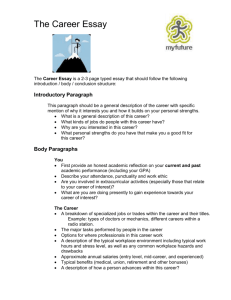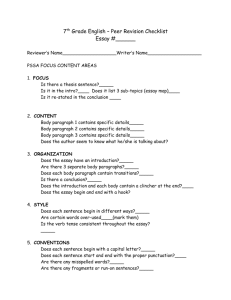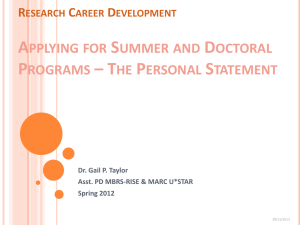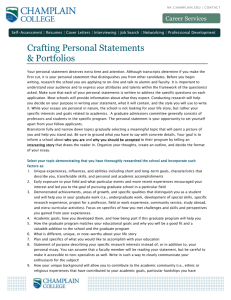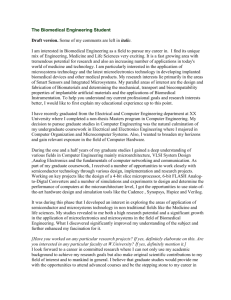Personal Statement Handout
advertisement
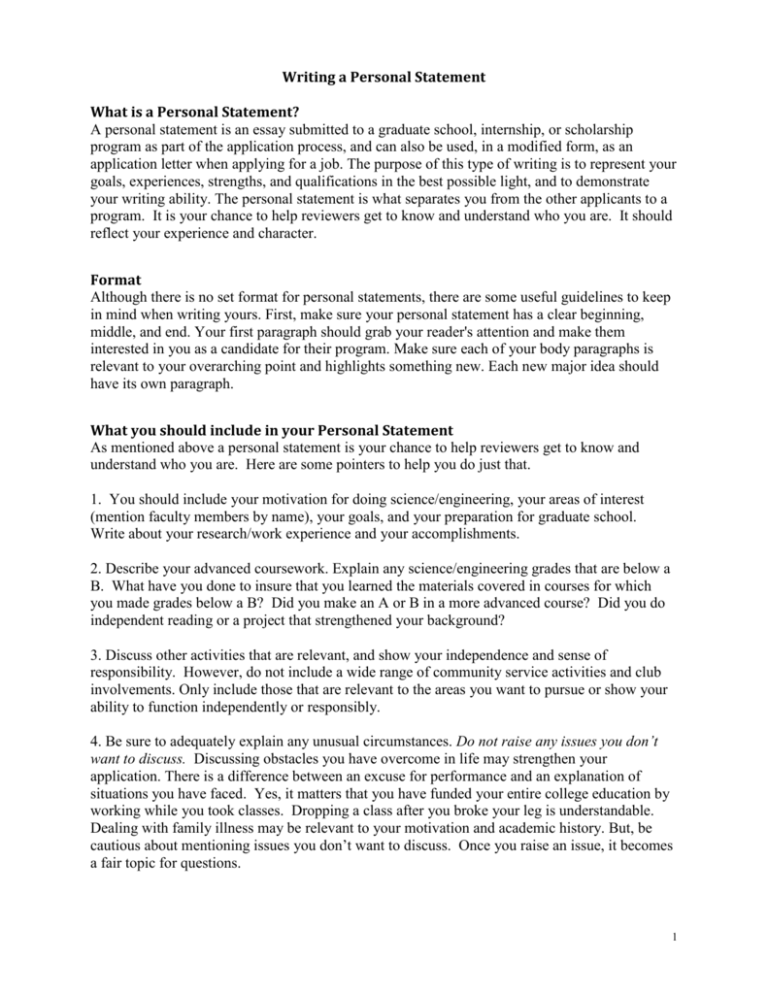
Writing a Personal Statement What is a Personal Statement? A personal statement is an essay submitted to a graduate school, internship, or scholarship program as part of the application process, and can also be used, in a modified form, as an application letter when applying for a job. The purpose of this type of writing is to represent your goals, experiences, strengths, and qualifications in the best possible light, and to demonstrate your writing ability. The personal statement is what separates you from the other applicants to a program. It is your chance to help reviewers get to know and understand who you are. It should reflect your experience and character. Format Although there is no set format for personal statements, there are some useful guidelines to keep in mind when writing yours. First, make sure your personal statement has a clear beginning, middle, and end. Your first paragraph should grab your reader's attention and make them interested in you as a candidate for their program. Make sure each of your body paragraphs is relevant to your overarching point and highlights something new. Each new major idea should have its own paragraph. What you should include in your Personal Statement As mentioned above a personal statement is your chance to help reviewers get to know and understand who you are. Here are some pointers to help you do just that. 1. You should include your motivation for doing science/engineering, your areas of interest (mention faculty members by name), your goals, and your preparation for graduate school. Write about your research/work experience and your accomplishments. 2. Describe your advanced coursework. Explain any science/engineering grades that are below a B. What have you done to insure that you learned the materials covered in courses for which you made grades below a B? Did you make an A or B in a more advanced course? Did you do independent reading or a project that strengthened your background? 3. Discuss other activities that are relevant, and show your independence and sense of responsibility. However, do not include a wide range of community service activities and club involvements. Only include those that are relevant to the areas you want to pursue or show your ability to function independently or responsibly. 4. Be sure to adequately explain any unusual circumstances. Do not raise any issues you don’t want to discuss. Discussing obstacles you have overcome in life may strengthen your application. There is a difference between an excuse for performance and an explanation of situations you have faced. Yes, it matters that you have funded your entire college education by working while you took classes. Dropping a class after you broke your leg is understandable. Dealing with family illness may be relevant to your motivation and academic history. But, be cautious about mentioning issues you don’t want to discuss. Once you raise an issue, it becomes a fair topic for questions. 1 5. Watch your adjectives – one word can change the whole impact. Words like “passion”, “thrill”, “committed” have their place in a personal statement if your actions backup your claims. Make sure your description of yourself matches the facts. 6. Check your grammar and spelling and make sure to use active voice sentences (I completed..., I conducted…). Get help with grammar if you need it, but pay attention and learn from the input you receive. Don’t just rely on someone else to fix your mistakes. Make sure it is clear what you have done, learned. 7. Have others (including faculty members) critique your personal statement. The MARC program has a writing tutor, and her hours will be discussed in class. 8. Revise, but don’t obsess over writing a perfect personal statement. Your goal is to write an essay that can be accurately understood. The essay should be your work, clarified by comments from others. A major reason they added the analytical writing components to the Graduate Record Exam (GRE) is because so many people had so much help in writing their personal statements that graduate faculty were very disappointed in the discrepancy between writing on the essays and writing performance in graduate school. Describing your research/work experience(s) The description of your past research/work experience is a very important part of your application to graduate school and can help you on almost any application. Take the time to write a thorough and unambiguous description of your experience(s). If you have multiple reallife experiences, you may want to list them but then focus on one that is the most relevant to the program to which you are applying or that shows your greatest level of achievement or independence. What do graduate schools want? Concise (usually no more than one to two page) description Evidence that you understood the project. Include the significance of the work, the goals of the work and how your contribution related to the goal. What you learned, without philosophizing. Just explain what you did. Examples of techniques/procedures you used and your familiarity with them. For example: A description might start with, “As a consequence of my studies of gene expression during spermatogenesis, I have a better understanding of how to extract RNA from cells and conduct hybridization experiments, including in situ hydridization. I developed light microscopy skills and improved my knowledge of basic statistical analysis.” Then expand the description to include more detail. The right details will earn you bonus points-the sizes of DNA fragments; the restriction sites; the sensitivity of an assy you develop, the type of computer language used in your program. Results, including publications and acknowledgements, if any. 2 General Advice Tell a story Think in terms of showing or demonstrating through concrete experience. One of the worst things you can do is to bore the admissions committee. If your statement is fresh, lively, and different, you’ll be putting yourself ahead of the pack. If you distinguish yourself through your story, you will make yourself memorable. Be specific Don’t, for example, state that you would make an excellent engineer unless you can back it up with specific reasons. Your desire to become an engineer or whatever should be logical, the result of specific experience that is descried in your statement. Your application should emerge as the logical conclusion to your story. Find an angle If you’re like most people, your life story lacks drama, so figuring out a way to make it interesting becomes the big challenge. Finding an angle or a “hook” is vital. Concentrate on your opening paragraph The lead or opening paragraph is generally the most important. It is here that you grab the reader’s attention or lose it. This paragraph becomes the framework for the rest of the statement. Write well and correctly Be meticulous. Type and proofread your essay very carefully. Express yourself clearly and concisely. Adhere to stated word limits. Don’t include some subjects There are certain things best left out of personal statements. For example, don’t mention potentially controversial subjects (for example, controversial religious or political issues). Do some research, if needed If a school wants to know why you’re applying to it rather than another school, do some research to find out what sets your choice apart from other universities or programs. If the school setting would provide an important geographical or cultural change for you, this might be a factor to mention. Avoid clichés Stay away from often-repeated or tired statements. It is essential that you allow yourself enough time to “craft” a polished piece of writing because it will take more than one draft. 3

